Rob Bignell's Blog, page 344
February 12, 2014
Ducks in order? Lineup vs. line-up vs. line up
Here is 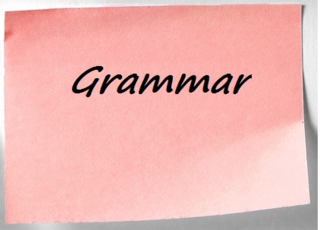 a lineup of words that you’ll want to get right: lineup, line-up and line up.
a lineup of words that you’ll want to get right: lineup, line-up and line up.
Lineup (no space) is a noun meaning a set of people, as in This year’s lineup at Operapalooza featured several great tenors.
Line up (a space between the words) is a verb meaning to place in a row, as in The Homecoming court will line up at 9 p.m. sharp.
Line-up isn’t a word, though some people erroneously use it as an adjective. Instead, use lineup (no space), as in The lineup order is from tallest to shortest.
Need an editor? Having your book, business document or academic paper proofread or edited before submitting it can prove invaluable. In an economic climate where you face heavy competition, your writing needs a second eye to give you the edge. I can provide that second eye.
Amazon.com Widgets
Related articles
 Sort it all out: Councilor vs. counselor
Sort it all out: Councilor vs. counselor Don't scam your readers: Rip-off vs. rip off
Don't scam your readers: Rip-off vs. rip off Do the right thing: Altar vs. alter
Do the right thing: Altar vs. alter Delete nulls from your novel, short story
Delete nulls from your novel, short story Ready your story for submission to publisher
Ready your story for submission to publisher
February 11, 2014
Create successful story by staging it
To write  a successful fiction story, you want to achieve what sometimes is referred to among writers as “staging” – that is, giving scenes such vividness that the characters and setting appear to pop right out of the book and appear before the reader. If that really happened, you’d be transfixed by the scene being played before you.
a successful fiction story, you want to achieve what sometimes is referred to among writers as “staging” – that is, giving scenes such vividness that the characters and setting appear to pop right out of the book and appear before the reader. If that really happened, you’d be transfixed by the scene being played before you.
Mastering the skill of staging is no simple process – unlike many of the tips given so far in the book, an author can’t just make a single change (use active voice rather than passive, vary sentence length, etc.) to achieve it. Rather, staging requires employing several varied skills.
Perhaps the most important general skill is ensuring that every word and element of the story serves the drama at hand. That means every word and element of the story must attempt to move forward the characters’ goals, must arise from their motivations, and must set them on collision courses. Too often among novice writers, stories include a lot of wasted words and scenes that don’t advance the characters and hence the plot. The result is unnecessary descriptions and dialogue and a theme that’s weakly supported. To address this when editing, always keep at the forefront of your mind what each characters’ goal is and ask yourself, “Does this word/sentence/paragraph show my characters attempting to achieve their goals and by doing so allows them to come into conflict?” If the answer is “no,” then seriously consider eliminating (or at least revising) that word/sentence/paragraph.
Another way to achieve successful staging is to ensure that every word and element of the story is in some way evocative, and in doing so serves the drama at hand. Evocative writing involves using active verbs, appealing to various senses, and employing symbolic writing such as similes and metaphors. Yet again, even the most beautifully written description of a setting is useless unless it somehow affects the characters’ goals. It might do that by setting the atmosphere and tone. Perhaps it demonstrates the great challenge ahead for a character. Perhaps it symbolizes the characters’ inner conflict. No matter how it does that, though, it always must advance the drama.
Need an editor? Having your book, business document or academic paper proofread or edited before submitting it can prove invaluable. In an economic climate where you face heavy competition, your writing needs a second eye to give you the edge. I can provide that second eye.
Amazon.com Widgets
Related articles
 Avoid using ALL CAPS in your writing
Avoid using ALL CAPS in your writing Five Great Quotations about Characters
Five Great Quotations about Characters Avoid shifting point of view in your story
Avoid shifting point of view in your story Select right word to avoid reader confusion
Select right word to avoid reader confusion Work off the fat from overwritten descriptions
Work off the fat from overwritten descriptions
February 10, 2014
Recent editing client releases his first novel
A recent 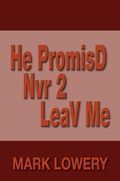 editing client of mine, Mark Lowery, has published his first novel, “He PromisD Nvr 2 LeaV Me.” The novel tells the story of Taran Johnson, a writer whose serene and opulent New York City lifestyle is derailed when he tries to honor a pledge made years earlier. His past and present collide, taking him back to a town he’d tried to forget, reintroducing him to a people and a culture he no longer recognizes. Along the way, he gets a scary look at drug addiction as his marriage and life are threatened. Can his growing faith save him? The book is available for purchase online.
editing client of mine, Mark Lowery, has published his first novel, “He PromisD Nvr 2 LeaV Me.” The novel tells the story of Taran Johnson, a writer whose serene and opulent New York City lifestyle is derailed when he tries to honor a pledge made years earlier. His past and present collide, taking him back to a town he’d tried to forget, reintroducing him to a people and a culture he no longer recognizes. Along the way, he gets a scary look at drug addiction as his marriage and life are threatened. Can his growing faith save him? The book is available for purchase online.
Need an editor? Having your book, business document or academic paper proofread or edited before submitting it can prove invaluable. In an economic climate where you face heavy competition, your writing needs a second eye to give you the edge. I can provide that second eye.
Amazon.com WidgetsRelated articles
 Prepare for good writing: All ready vs. already
Prepare for good writing: All ready vs. already A restrictive writing tip: That vs. which
A restrictive writing tip: That vs. which Editing client publishes alcohol addiction book
Editing client publishes alcohol addiction book Editing client releases first literary novel
Editing client releases first literary novel
February 9, 2014
Five Great Quotations about Critics
“There is 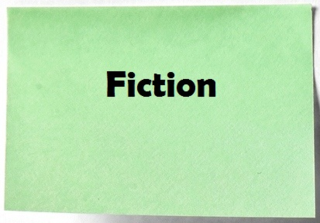 probably no hell for authors in the next world - they suffer so much from critics and publishers in this.” – C. N. Bovee
probably no hell for authors in the next world - they suffer so much from critics and publishers in this.” – C. N. Bovee
“Asking a working writer what he thinks about critics is like asking a lamppost how it feels about dogs.” – Christopher Hampton
“What a blessed thing it is that nature, when she invented, manufactured and patented her authors, contrived to make critics out of the chips that were left!” – Oliver Wendell Holmes
“There is no mistaking the dismay on the face of a writer who has just heard that his brain child is a deformed idiot.” – L. Sprague de Camp
“Thank your readers and the critics who praise you, and then ignore them. Write for the most intelligent, wittiest, wisest audience in the universe: Write to please yourself.” – Harlan Ellison
Need an editor? Having your book, business document or academic paper proofread or edited before submitting it can prove invaluable. In an economic climate where you face heavy competition, your writing needs a second eye to give you the edge. I can provide that second eye.
Amazon.com Widgets
Related articles
 Five Great Quotations about the Power of Writing
Five Great Quotations about the Power of Writing Start your story with solid narrative hook
Start your story with solid narrative hook Five Great Quotations about Characters
Five Great Quotations about Characters Five Great Quotations about Editing
Five Great Quotations about Editing How long and frequent should author's blog be?
How long and frequent should author's blog be?
February 8, 2014
Client’s new novel lampoons court system
A recent 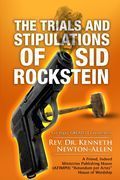 editing client of mine, Kenneth Newton-Allen, has published his first book, the comedic novel “The Trials and Stipulations of Sid Rockstein.” The book pierces the judicial robe to provide us with a panoramic and penetrating view of the American court system by following Sid Rockstein’s professional odyssey from that of being a highly successful personal injury attorney through his promotional appointment to a judgeship and his inglorious re-entry once again to the practice of law. The book is available online.
editing client of mine, Kenneth Newton-Allen, has published his first book, the comedic novel “The Trials and Stipulations of Sid Rockstein.” The book pierces the judicial robe to provide us with a panoramic and penetrating view of the American court system by following Sid Rockstein’s professional odyssey from that of being a highly successful personal injury attorney through his promotional appointment to a judgeship and his inglorious re-entry once again to the practice of law. The book is available online.
Need an editor? Having your book, business document or academic paper proofread or edited before submitting it can prove invaluable. In an economic climate where you face heavy competition, your writing needs a second eye to give you the edge. I can provide that second eye.
Amazon.com WidgetsRelated articles
 Editing client releases quest novel sequel
Editing client releases quest novel sequel Coming up with great story ideas
Coming up with great story ideas
February 7, 2014
Marketing Tip: Donate copies of your book
Partner with  a local organization or charity, donating free signed copies of your books to be auctioned. Another twist is to run promotions in which you announce you’ll donate a percentage of profits from your books, sold during a specific time period, to a charity or organization. This typically works best if done in conjunction with a charity related to your book’s topic or during a specific period, such as a holiday or an awareness month. Such efforts help get your name before the public and may even result in a little press attention. At the very least, helping others is the right thing for all of us to do.
a local organization or charity, donating free signed copies of your books to be auctioned. Another twist is to run promotions in which you announce you’ll donate a percentage of profits from your books, sold during a specific time period, to a charity or organization. This typically works best if done in conjunction with a charity related to your book’s topic or during a specific period, such as a holiday or an awareness month. Such efforts help get your name before the public and may even result in a little press attention. At the very least, helping others is the right thing for all of us to do.
Need an editor? Having your book, business document or academic paper proofread or edited before submitting it can prove invaluable. In an economic climate where you face heavy competition, your writing needs a second eye to give you the edge. I can provide that second eye.
Amazon.com WidgetsRelated articles
 Use YouTube to promote your book
Use YouTube to promote your book Marketing Tip: Exploit Your "Local" Status
Marketing Tip: Exploit Your "Local" Status Marketing Tip: Offer a Discount Price
Marketing Tip: Offer a Discount Price Why you want an LCCN for your book
Why you want an LCCN for your book Five Great Quotations about Editors
Five Great Quotations about Editors
February 6, 2014
Ebook readers continue to prefer Amazon.com; ereaders giving way to tablets, however
Readers who 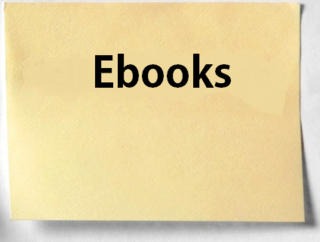 prefer ebooks continue to rely on Amazon Kindle for their ereading device and likely will continue to do so in the year ahead.
prefer ebooks continue to rely on Amazon Kindle for their ereading device and likely will continue to do so in the year ahead.
Indeed, of ereaders and tablets (A tablet can serve as an ereader but allows access to other entertainment such as videos and music.) that carry ebooks, Amazon Kindle dominates. Of those who read ebooks, 38 percent do so on a Kindle ereader, according to a Book Industry Study Group done in summer 2013. Amazon’s Kindle Fire Tablet is in third place at 25 percent.
Apple follows in second place. Of ebook readers, 27 percent do so on an iPad tablet and another 5 percent on an iPad mini tablet.
Barnes and Noble’s Nook is in third with 11 percent using a Nook ereader and 5 percent a Nook tablet.
Google ranks fourth with its Android tablet (such as a Samsung Galaxy) at 12 percent. Microsoft lags in last with its surface tablet at 2 percent.
Be aware that these numbers add up to more than 100 because sometimes readers own and use more than one device to access ebooks.
In the year ahead, ebook readership likely will tilt to tablets with ereaders diminishing in importance. About a third of ebook readers plan to buy a tablet rather than a Kindle or Nook ereader.
This likely won't reduce, at least in any dramatic fashion, Amazon's domination of the ebook market. An equal percentage of ereader owners plan to buy either an Apple iPad tablet or the Kindle Fire tablet.
It probably will result in a reduction of Barnes and Noble's market share, however, as ereader owners planning to buy either a Nook ereader or a Nook Tablet rank at the bottom of all of the aforementioned readers and tablets.
How does this impact self-publishing? Rather than developing ebooks solely for simple ereaders, authors and publishers will need to think about how the tablet might affect the way readers interact and use books.
Need an editor? Having your book, business document or academic paper proofread or edited before submitting it can prove invaluable. In an economic climate where you face heavy competition, your writing needs a second eye to give you the edge. I can provide that second eye.
Amazon.com WidgetsRelated articles
 How to format line spacing for an ebook
How to format line spacing for an ebook
February 5, 2014
A restrictive writing tip: That vs. which
Here’s a 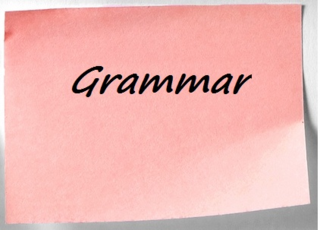 writing tip that is absolutely necessary for authors to get right, which is important for being taken seriously.
writing tip that is absolutely necessary for authors to get right, which is important for being taken seriously.
Use that if anything appearing after the word limits (Grammarists use the word “restrictive.”) to a specific class of what you’re writing about. For example, Guys like cars that go fast. The word that specifies what kinds of cars guys like – fast ones. This tells readers that the author doesn’t mean slow cars.
Use which if anything appearing after the word is additional information that’s nice to know but not really important to understanding the sentence (Grammarists use the word “nonrestrictive.”). For example, Fast cars, which have been around for several generations, always catch a guy’s eye. The word which indicates what follows is extra information; readers don’t need to know that cars have been around for generations to understand from the sentence that fast cars always catch a guy’s fancy.
Because which is extraneous information, a clause beginning with that word is set off with commas. Because that is necessary information, commas are not used to set off the clause beginning with that word.
Need an editor? Having your book, business document or academic paper proofread or edited before submitting it can prove invaluable. In an economic climate where you face heavy competition, your writing needs a second eye to give you the edge. I can provide that second eye.
Amazon.com Widgets
Related articles
 Don't let perfectionism strangle your creativity
Don't let perfectionism strangle your creativity Five Great Quotations about Why We Must Write
Five Great Quotations about Why We Must Write Select right word to avoid reader confusion
Select right word to avoid reader confusion Don't be guilty of polysyllabism (Huh?)
Don't be guilty of polysyllabism (Huh?) When should you start a new novel chapter?
When should you start a new novel chapter?
February 4, 2014
Maintain tone by avoiding subjective tension
Sometimes when 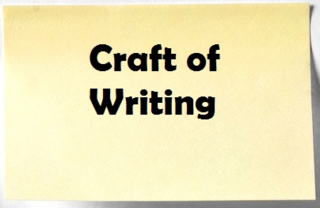 selecting which word to use, our aim is off. Usually, this can be resolved simply by thinking a little bit more about exactly what is meant and then changing that word.
selecting which word to use, our aim is off. Usually, this can be resolved simply by thinking a little bit more about exactly what is meant and then changing that word.
When our aim is off on more than a word but a whole passages of text, writers commit the error of “subjective tension.” This is “the difference between what you mean and what you actually say,” an apt phrase coined by science fiction writer Samuel R. Delany.
Usually this difference amounts to something that is humorous or campy, which can break the tone of your piece. Some examples include:
g Her jaw fell to the floor.
g He jumped through the door.
g She strained her eyes as looking through the window.
g He twisted up her face.
Of course, not of these images literally can take place. Hence, the suspension of disbelief that a reader brings to a story is broken.
A variant of subjective tension is the gag detail, which is “an unnecessarily unrealistic detail that blows the story’s credibility,” according to CSFW’s Sarah Smith, who devised the term. An example of a gag detail she gives is, “I can accept a Neanderthal going to Harvard, but a Neanderthal with a middle name? Gag.”
Sometimes, though, subjective tension and gag details can be used to great effect. They can help form the repertoire of jokes in a humorous story, as in Douglas Adams’ “The Hitchhiker’s Guide to the Galaxy.” If done right and maintained throughout the entire piece, they can create a deliberately campy and fun story, such as the 1960s “Batman” television series.
Need an editor? Having your book, business document or academic paper proofread or edited before submitting it can prove invaluable. In an economic climate where you face heavy competition, your writing needs a second eye to give you the edge. I can provide that second eye.
Related articles
 Select right word to avoid reader confusion
Select right word to avoid reader confusion Shun beautiful writing done for beauty's sake
Shun beautiful writing done for beauty's sake Mimic sounds to appeal to sense of hearing
Mimic sounds to appeal to sense of hearing Maintain sense of tension through pace
Maintain sense of tension through pace Avoid shifting point of view in your story
Avoid shifting point of view in your story
February 3, 2014
Editing client releases first literary novel
An editing 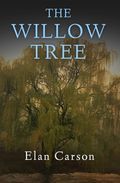 client of mine, Elan Carson, has published her first novel, “The Willow Tree.” The novel tells the story of Emma, who must learn to fight for her emotional stability and life when she engages in a stormy relationship with her abusive stepfather, as her mother slips away to depression. “The Willow Tree” is available online in paperback and ebook.
client of mine, Elan Carson, has published her first novel, “The Willow Tree.” The novel tells the story of Emma, who must learn to fight for her emotional stability and life when she engages in a stormy relationship with her abusive stepfather, as her mother slips away to depression. “The Willow Tree” is available online in paperback and ebook.
Need an editor? Having your book, business document or academic paper proofread or edited before submitting it can prove invaluable. In an economic climate where you face heavy competition, your writing needs a second eye to give you the edge. I can provide that second eye.
Amazon.com WidgetsRelated articles
 Editing client publishes alcohol addiction book
Editing client publishes alcohol addiction book Editing client releases novel based on true story
Editing client releases novel based on true story Editing client releases first near-future novel
Editing client releases first near-future novel Editing client releases self-help book
Editing client releases self-help book Editing client's latest novel hits top 25
Editing client's latest novel hits top 25



